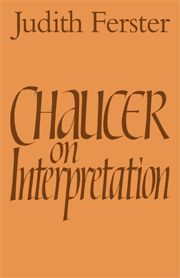Book contents
- Frontmatter
- Contents
- Preface
- 1 Introduction
- 2 Interpretation in the Knight's Tale
- 3 Reading Nature in the Parliament of Fowls
- 4 The Lady White and the White Tablet: The Book of the Duchess
- 5 Reading Griselda: The Clerk's Tale
- 6 Reading the Self: The Wife of Bath
- 7 The Politics of Narration in the Frame of the Canterbury Tales
- Notes
- Index
5 - Reading Griselda: The Clerk's Tale
Published online by Cambridge University Press: 04 August 2010
- Frontmatter
- Contents
- Preface
- 1 Introduction
- 2 Interpretation in the Knight's Tale
- 3 Reading Nature in the Parliament of Fowls
- 4 The Lady White and the White Tablet: The Book of the Duchess
- 5 Reading Griselda: The Clerk's Tale
- 6 Reading the Self: The Wife of Bath
- 7 The Politics of Narration in the Frame of the Canterbury Tales
- Notes
- Index
Summary
THE BOOK OF THE DUCHESS delicately balances the idea that the other is independent of us against the idea that the other may be at least partly shaped by interaction with us. The poem suggests that the ethical response to this paradox is good will – treating the other as if it existed independently. The narrator benefits from treating his interlocutors of uncertain ontological status as if they really existed, and the Black Knight earns the narrator's sympathy when he shifts from speaking about White's death as his experience to speaking about it as hers.
The Clerk's Tale also examines this paradox, but from a different angle. The Book of the Duchess emphasizes good will – assuming the independence of the other and trying to understand his subjectivity rather than imposing one's own on him. The Clerk's Tale shows the consequences of overemphasizing the independence of the other and being blind to the shaping power of social context. Walter treats Griselda with good will, in the special sense I have been using – conviction of her separateness from him. He believes that she is independent of him and unknown. His attempt to know her disrupts the family and causes both partners pain. The Clerk's Tale exaggerates the good will seen in the Book of the Duchess and shows that the acknowledgment of the other's otherness can be destructive unless it is accompanied by acknowledgment of our influence on the other.
- Type
- Chapter
- Information
- Chaucer on Interpretation , pp. 94 - 121Publisher: Cambridge University PressPrint publication year: 1985



